Emha Ainun Nadjib was born in Jombang, East Java on May 27th, 1953, the fourth of fifteen children. His formal education ended at semester one of the Faculty of Economics at the Gadja Mada University, Yogyakarta. Prior to that he had been ‘expelled’ from the Madrassah-style Islamic boarding school of ‘Pondok Modern Gontor Ponorogo’ near Solo as a result of a ‘demonstration’ he led against the school’s security department during the third year of his studies there. He then moved to Yogyakarta where he graduated from the SMA Muhammadiyah High School.
Emha spent the five years between 1970 – 1975 living on Malioboro, Yogyakarta, while studying literature with a teacher he revered, Umbu Landu Paranggi, a Sufi who led a mysterious life and who had a major influence on Emha’s thought and career.
He then began to work in Yogyakarta’s multi-media arts scene where he worked with a number of theatre groups including Dinasti, and performed in a substantial repertoire. His plays focused on political issues such as the development of personality cults, the exploitation of the people by various modern institutions as well as the failure of such institutions. All were dealt with allegorically.
Then, with the Salahudin Theatre Group, he produced a play in 1990 which was performed outside at the renowned Gontor Madrassh with the participation of all the santri (students) and an audience of some 35,000. Again in 1990 he produced Lautan Jilbab or the Sea of Veils, which was performed widely across Indonesia.
In 1992 came Perahu Retak or The Cracked Boat, which dealt allegorically with Indonesia’s New Order government, set amid the conflicts of the period prior to the rising of the empire of Mataram. In the years that followed some twenty volumes of poetry have been published as well as at least forty collections of essays.
Emha has also participated in multi-cultural theatre in the Philippines (1980), the International Writing Program at the University of Iowa, USA (1984), The International Songwriters Festival, Rotterdam (1984) and the Festival Horizonte III in West Berlin, Germany (1985).
Considering the above, it would be surprising if Emha were not lauded as an exemplary Indonesian writer and a contributor to many other fields of culture, the arts, religious and social thought. However, despite the prolific nature and consistent quality of his work, his name is rarely heard in the same context as, for example, the name of Goenawan Muhammad, Rendra or the late Pramoedya Ananta Toer. This is perhaps due to the simply plurality of areas in which Emha is active. He is a writer, a performer, a social activist and a religious philosopher.
Emha works directly with the people and conducts a wide range of arts activities. He is active in religious thought (Islamic and interfaith), political education, economic synergy and capacity building, all designed to stimulate the optimum potential of the people, both rural and urban. He has a range of monthly events in cities and areas across Indonesia where he is requested directly to perform by local communities.
In this way, Emha generally performs (though that is not the best term to describe his appearances) at around ten to fifteen events per month, often accompanied by the music of the Kiai Kanjeng gamelan orchestra. Emha also makes numerous personal appearances, which are often outdoors, with all levels and strata of the population. At these events, Emha gathers all groups, streams of thought and religious communities to enjoy simple human solidarity, dialogue and togetherness.
Emha responded to the reform period of the last ten years in Indonesia with a movement known as Kenduri Cinta or Feast of Love. Kenduri Cinta is the Jakarta-based version of Padhang mBulan, which means ‘the full moon’. Kenduri Cinta is arguably less an event and more a state of mind. It is a vehicle for engendering love and humanism among people who may be affected by disputes, poverty, displacement or other social pressures, through a gathering accompanied by music, shalawat (musical chants in praise of the Prophet Muhammad), poetry and discourse. In this way Emha has helped to heal social rifts all over Indonesia, solving acute problems wherever he and the Kiai Kanjeng gamelan orchestra are invited to perform.
In Yogyakarta the movement is know as Mocopat Syafaat; in Semarang Gambang Syafaat. A new gathering began in Surabaya in August 2006 known as Bambang Wetan, indicating the rise of the East.
Older still than the Kenduri Cinta movement is the Padang Mbulan or Full Moon movement itself. Padang mbulan is a monthly gathering that takes place in Jombang, East Java, attended by thousands of grassroots supporters eager to attend for the music, the poetry, the Islamic devotional aspects or the discourse.
Within Indonesia Emha’s enormous impact on social discourse over the last two to three decades is either overlooked or under-rated. Despite the volume of material produced by Emha in various fields, his work is not part of the Indonesian literary mainstream. This is ironic, given that Emha, or Cak Nun as he is more popularly known, is very well known in his native Indonesia.
Emha has written numerous books and plays such as the controversial Lautan Jilbab. Throughout the 1990s he was frequently on TV for special concert events. He had his own talkshow; Gardu and daily programmes during the Ramadhan fasting month. His comments on life and faith are broadcast throughout the day on Delta FM radio and he has issued a considerable number of CDs and cassettes. Among the best known of these is the album Kado Muhammad or the Gift of Muhammad, which includes the song Tombo Ati, a soulful reflection on piety and ways to ease the heart through faith.
Emha is also well known for as his sharp political comment, which earned him a certain degree of notoriety during the later Suharto years, and for his dynamic live performances. While Islamic themes and motifs certainly permeate his music, it remains soundly based on the ethnic rhythms and traditions of the Indonesian archipelago. In fact he is able to temper his performance to locality in which he is performing, blending local folk songs, instrumentation and dialects with Western and other musical forms.
In response to growing interest from overseas, Emha has made a determined effort to bring those ethnic rhythms and traditions to far shores. The group have toured internationally, visiting Korea, Egypt, Malaysia and Australia, and building a strong reputation for highly charged, dynamic and emotional performances. In November 2004 they embarked on the first of two tours of the UK and Europe, playing to audiences in 25 cities.
During the second tour in February and March, Emha was awarded the Islamic Medal of Excellence by the Muslim News. Britain’s Chancellor of the Exchequer Gordon Brown was present at the ceremony on March 23rd and hailed Emha’s contribution to Islamic understanding. It would seem that the UK is more aware of Emha’s work and more willing to recognise it than are many of his compatriots in his native Indonesia.
In September 2006, accompanied by Ian L. Betts, Emha spoke at a series of keynote panels at the Melbourne Writers’ Festival, focusing on Islam, and relations between Indonesia and Australia. The key success of the event was his reiteration that Islam in Indonesia is in fact represented more by his own work in the areas of inter-faith dialogue etc, than it is is by the radicals and extremists who were behind the Bali bombings and other terrorist acts. In November 2006 Emha and Kiai Kanjeng toured Finland, opening a major international cultural fesitival.
Emha once wrote a song entitled Jalan Sunyi; the Silent Path, and though his own path may initially appear to have been a silent one, his work has spoken volumes to an audience of inspired listeners and readers. A book written on the work of Emha and Kiai Kanjeng has been written by Ian L. Betts and was published by Indonesia’s Kompas Gramedia in June 2006. Entitiled Jalan Sunyi Emha, it tells of his life and work over the last three decades. An English language version is expected soon, to be entited The Silent Pilgrimage: Emha Ainun Nadjib and His Lifelong Journey of Faith.
Emha spent the five years between 1970 – 1975 living on Malioboro, Yogyakarta, while studying literature with a teacher he revered, Umbu Landu Paranggi, a Sufi who led a mysterious life and who had a major influence on Emha’s thought and career.
He then began to work in Yogyakarta’s multi-media arts scene where he worked with a number of theatre groups including Dinasti, and performed in a substantial repertoire. His plays focused on political issues such as the development of personality cults, the exploitation of the people by various modern institutions as well as the failure of such institutions. All were dealt with allegorically.
Then, with the Salahudin Theatre Group, he produced a play in 1990 which was performed outside at the renowned Gontor Madrassh with the participation of all the santri (students) and an audience of some 35,000. Again in 1990 he produced Lautan Jilbab or the Sea of Veils, which was performed widely across Indonesia.
In 1992 came Perahu Retak or The Cracked Boat, which dealt allegorically with Indonesia’s New Order government, set amid the conflicts of the period prior to the rising of the empire of Mataram. In the years that followed some twenty volumes of poetry have been published as well as at least forty collections of essays.
Emha has also participated in multi-cultural theatre in the Philippines (1980), the International Writing Program at the University of Iowa, USA (1984), The International Songwriters Festival, Rotterdam (1984) and the Festival Horizonte III in West Berlin, Germany (1985).
Considering the above, it would be surprising if Emha were not lauded as an exemplary Indonesian writer and a contributor to many other fields of culture, the arts, religious and social thought. However, despite the prolific nature and consistent quality of his work, his name is rarely heard in the same context as, for example, the name of Goenawan Muhammad, Rendra or the late Pramoedya Ananta Toer. This is perhaps due to the simply plurality of areas in which Emha is active. He is a writer, a performer, a social activist and a religious philosopher.
Emha works directly with the people and conducts a wide range of arts activities. He is active in religious thought (Islamic and interfaith), political education, economic synergy and capacity building, all designed to stimulate the optimum potential of the people, both rural and urban. He has a range of monthly events in cities and areas across Indonesia where he is requested directly to perform by local communities.
In this way, Emha generally performs (though that is not the best term to describe his appearances) at around ten to fifteen events per month, often accompanied by the music of the Kiai Kanjeng gamelan orchestra. Emha also makes numerous personal appearances, which are often outdoors, with all levels and strata of the population. At these events, Emha gathers all groups, streams of thought and religious communities to enjoy simple human solidarity, dialogue and togetherness.
Emha responded to the reform period of the last ten years in Indonesia with a movement known as Kenduri Cinta or Feast of Love. Kenduri Cinta is the Jakarta-based version of Padhang mBulan, which means ‘the full moon’. Kenduri Cinta is arguably less an event and more a state of mind. It is a vehicle for engendering love and humanism among people who may be affected by disputes, poverty, displacement or other social pressures, through a gathering accompanied by music, shalawat (musical chants in praise of the Prophet Muhammad), poetry and discourse. In this way Emha has helped to heal social rifts all over Indonesia, solving acute problems wherever he and the Kiai Kanjeng gamelan orchestra are invited to perform.
In Yogyakarta the movement is know as Mocopat Syafaat; in Semarang Gambang Syafaat. A new gathering began in Surabaya in August 2006 known as Bambang Wetan, indicating the rise of the East.
Older still than the Kenduri Cinta movement is the Padang Mbulan or Full Moon movement itself. Padang mbulan is a monthly gathering that takes place in Jombang, East Java, attended by thousands of grassroots supporters eager to attend for the music, the poetry, the Islamic devotional aspects or the discourse.
Within Indonesia Emha’s enormous impact on social discourse over the last two to three decades is either overlooked or under-rated. Despite the volume of material produced by Emha in various fields, his work is not part of the Indonesian literary mainstream. This is ironic, given that Emha, or Cak Nun as he is more popularly known, is very well known in his native Indonesia.
Emha has written numerous books and plays such as the controversial Lautan Jilbab. Throughout the 1990s he was frequently on TV for special concert events. He had his own talkshow; Gardu and daily programmes during the Ramadhan fasting month. His comments on life and faith are broadcast throughout the day on Delta FM radio and he has issued a considerable number of CDs and cassettes. Among the best known of these is the album Kado Muhammad or the Gift of Muhammad, which includes the song Tombo Ati, a soulful reflection on piety and ways to ease the heart through faith.
Emha is also well known for as his sharp political comment, which earned him a certain degree of notoriety during the later Suharto years, and for his dynamic live performances. While Islamic themes and motifs certainly permeate his music, it remains soundly based on the ethnic rhythms and traditions of the Indonesian archipelago. In fact he is able to temper his performance to locality in which he is performing, blending local folk songs, instrumentation and dialects with Western and other musical forms.
In response to growing interest from overseas, Emha has made a determined effort to bring those ethnic rhythms and traditions to far shores. The group have toured internationally, visiting Korea, Egypt, Malaysia and Australia, and building a strong reputation for highly charged, dynamic and emotional performances. In November 2004 they embarked on the first of two tours of the UK and Europe, playing to audiences in 25 cities.
During the second tour in February and March, Emha was awarded the Islamic Medal of Excellence by the Muslim News. Britain’s Chancellor of the Exchequer Gordon Brown was present at the ceremony on March 23rd and hailed Emha’s contribution to Islamic understanding. It would seem that the UK is more aware of Emha’s work and more willing to recognise it than are many of his compatriots in his native Indonesia.
In September 2006, accompanied by Ian L. Betts, Emha spoke at a series of keynote panels at the Melbourne Writers’ Festival, focusing on Islam, and relations between Indonesia and Australia. The key success of the event was his reiteration that Islam in Indonesia is in fact represented more by his own work in the areas of inter-faith dialogue etc, than it is is by the radicals and extremists who were behind the Bali bombings and other terrorist acts. In November 2006 Emha and Kiai Kanjeng toured Finland, opening a major international cultural fesitival.
Emha once wrote a song entitled Jalan Sunyi; the Silent Path, and though his own path may initially appear to have been a silent one, his work has spoken volumes to an audience of inspired listeners and readers. A book written on the work of Emha and Kiai Kanjeng has been written by Ian L. Betts and was published by Indonesia’s Kompas Gramedia in June 2006. Entitiled Jalan Sunyi Emha, it tells of his life and work over the last three decades. An English language version is expected soon, to be entited The Silent Pilgrimage: Emha Ainun Nadjib and His Lifelong Journey of Faith.

































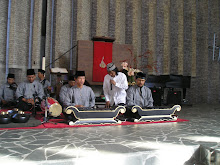
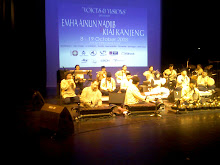

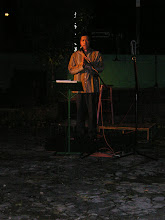



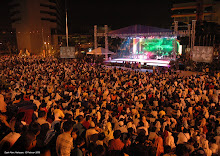
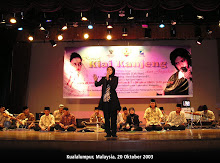
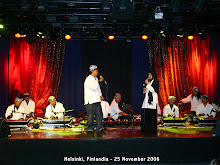.jpg)



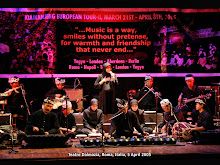


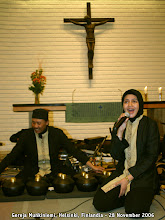.jpg)

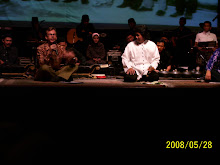.jpg)
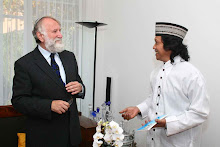
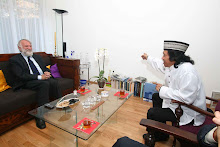
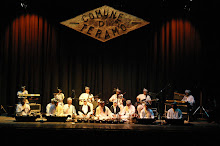


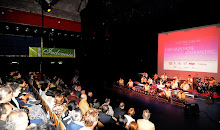

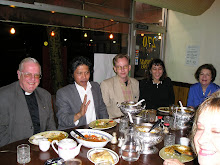


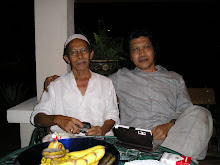
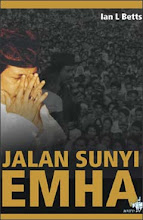
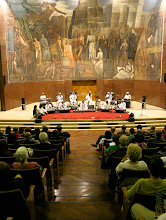
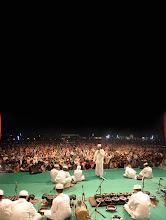

No comments:
Post a Comment